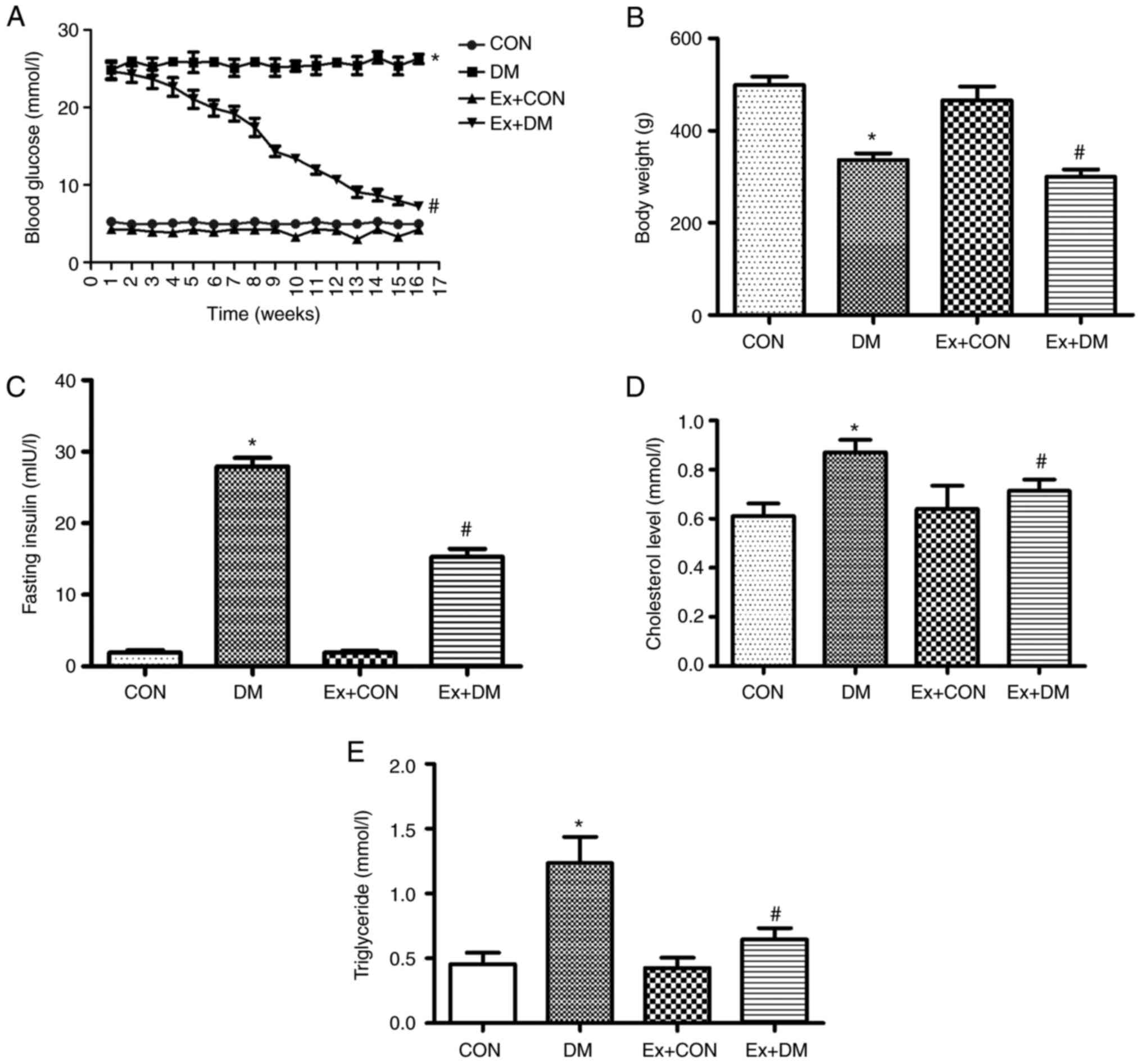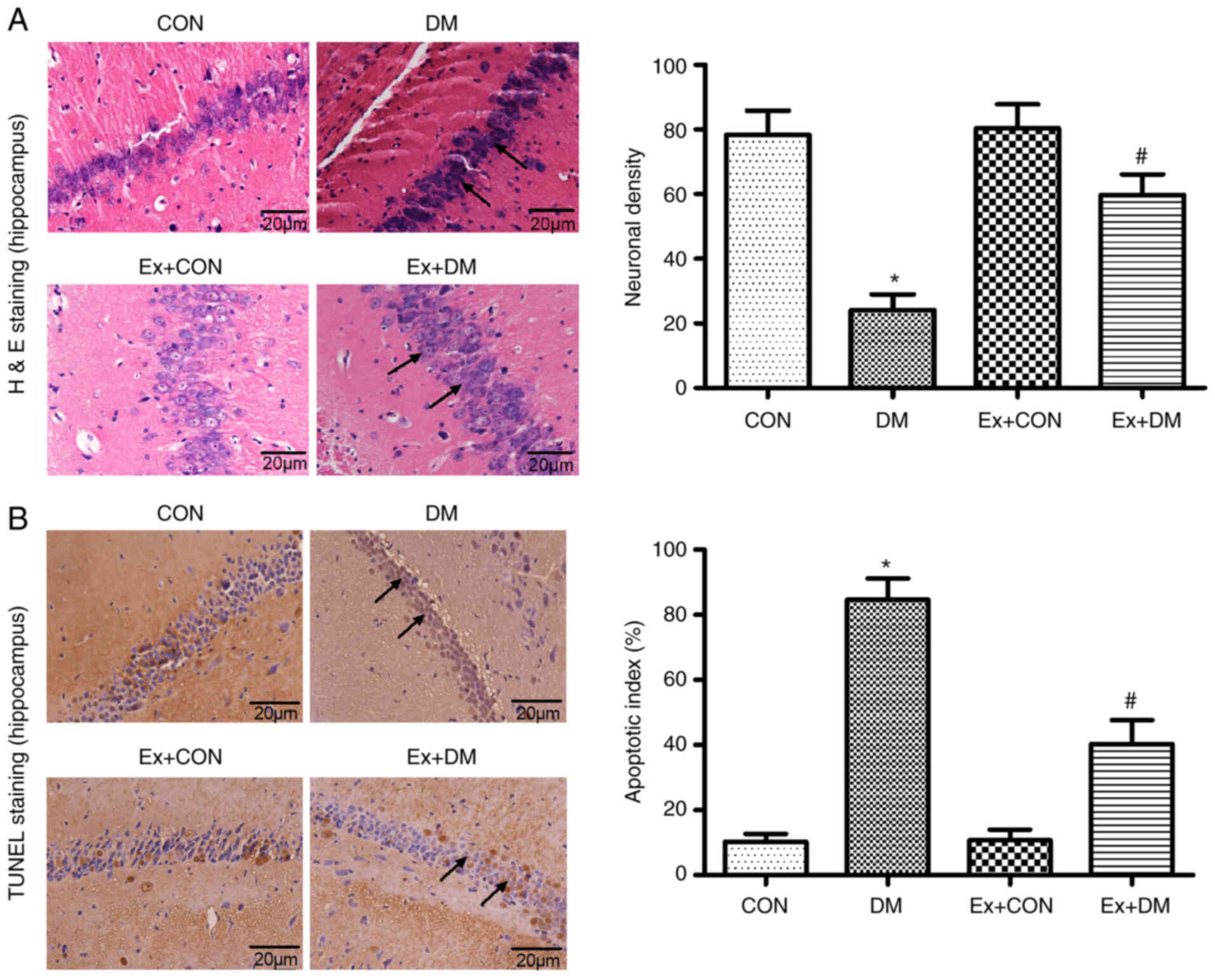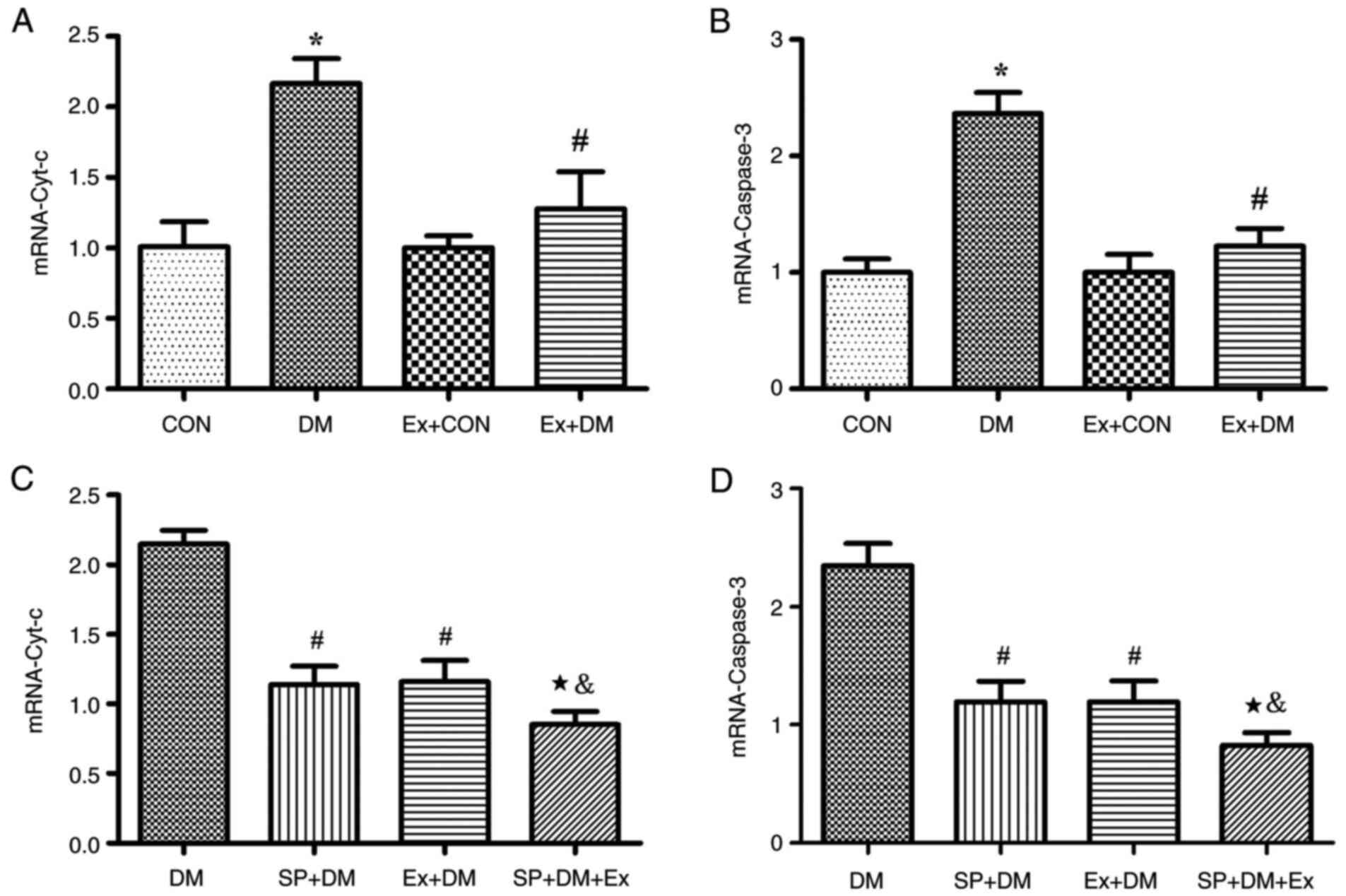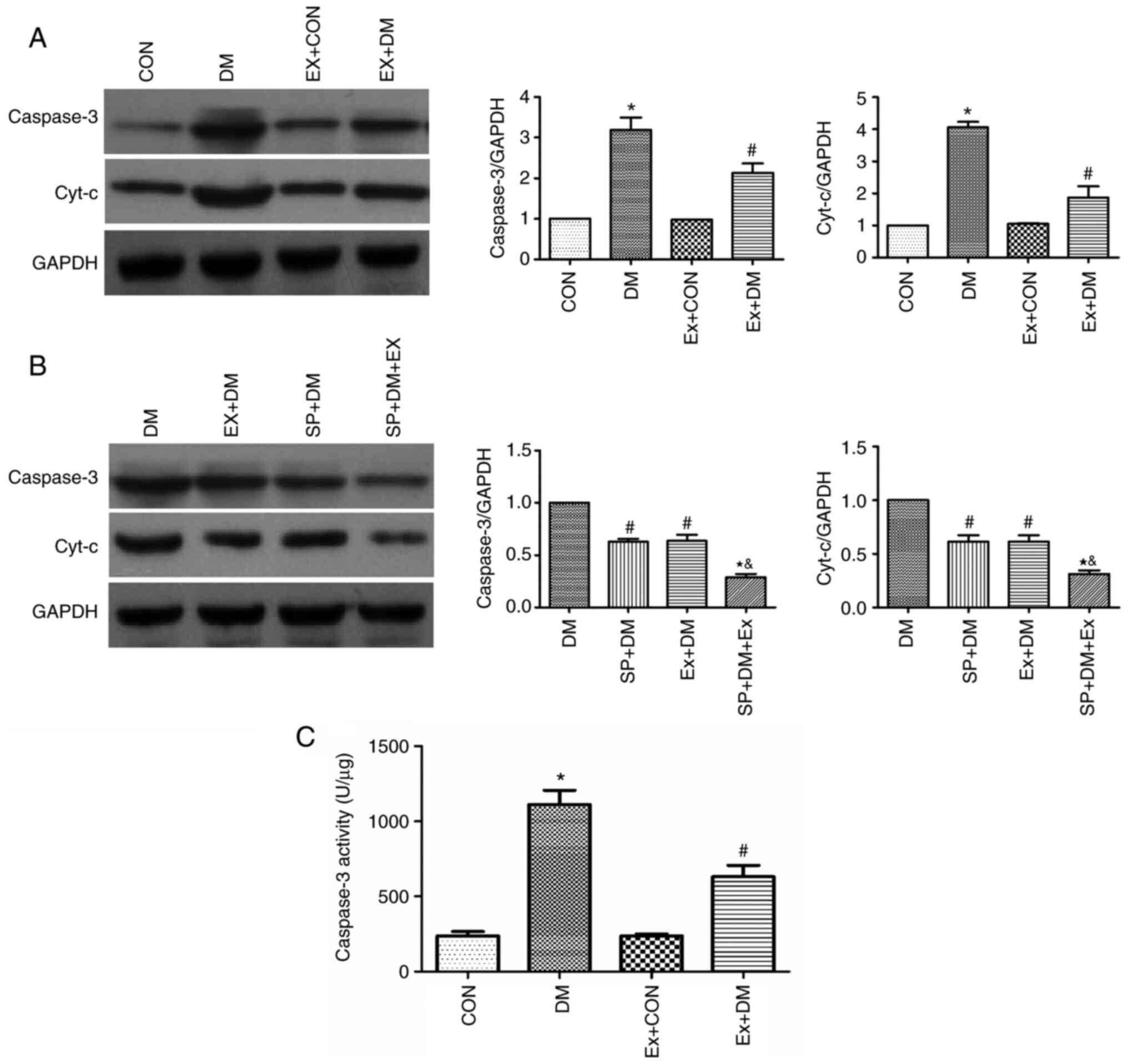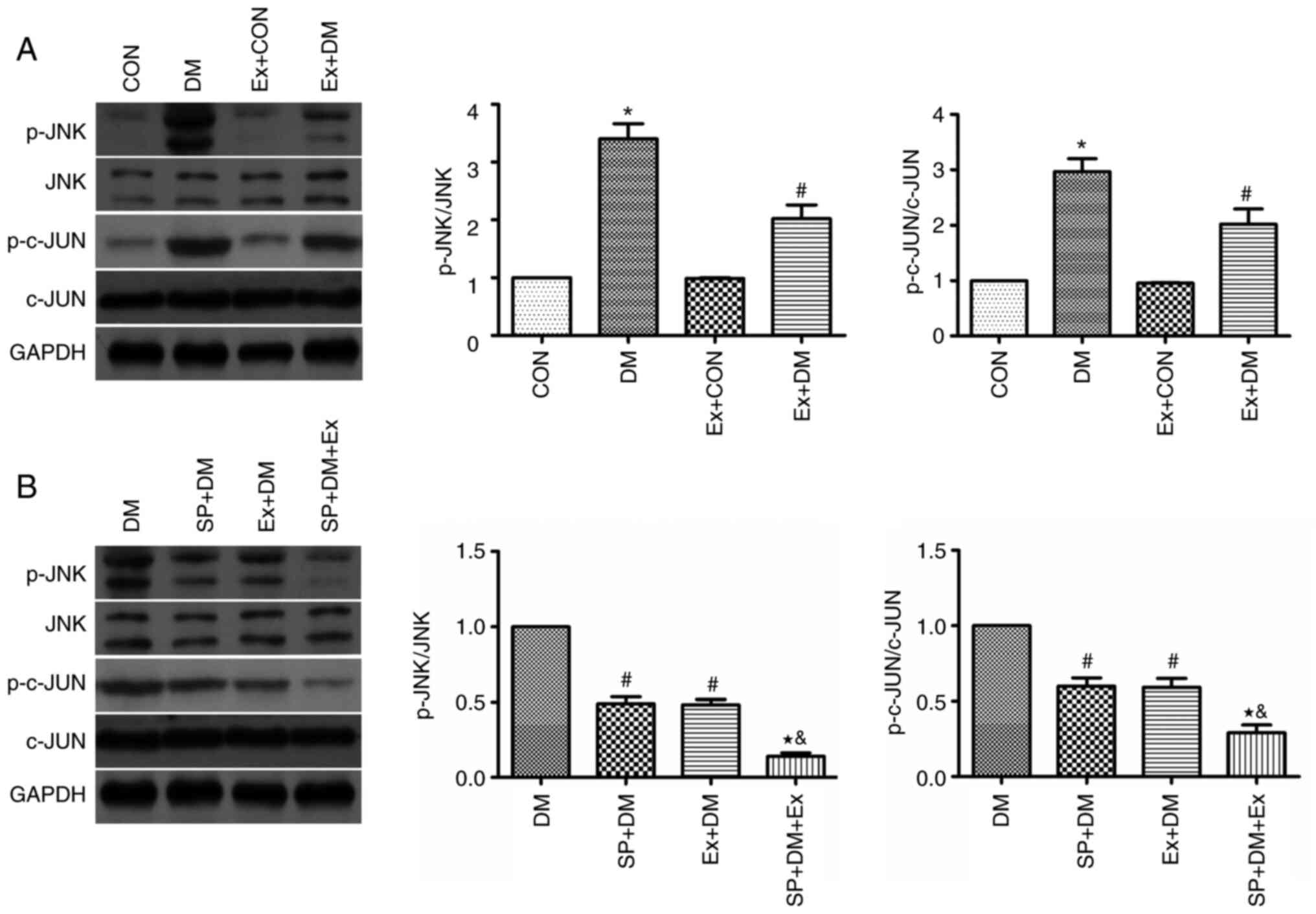|
1
|
Prieto-Gómez B, Díaz-Vázquez M and
Pérez-Torres D: Hippocampal electrophysiological changes during the
elicited metabolic syndrome in Wistar rats. Metabol Open.
5:1000272020. View Article : Google Scholar : PubMed/NCBI
|
|
2
|
Meng Y, Wang W, Kang J, Wang X and Sun L:
Role of the PI3K/AKT signalling pathway in apoptotic cell death in
the cerebral cortex of streptozotocin-induced diabetic rats. Exp
Ther Med. 13:2417–2422. 2017. View Article : Google Scholar : PubMed/NCBI
|
|
3
|
Moran C, Beare R, Wang W, Callisaya M and
Srikanth V; Alzheimer's Disease Neuroimaging Initiative (ADNI), :
Type 2 diabetes mellitus, brain atrophy, and cognitive decline.
Neurology. 92:e823–e830. 2019. View Article : Google Scholar : PubMed/NCBI
|
|
4
|
Chornenkyy Y, Wang WX, Wei A and Nelson
PT: Alzheimer's disease and type 2 diabetes mellitus are distinct
diseases with potential overlapping metabolic dysfunction upstream
of observed cognitive decline. Brain Pathol. 29:3–17. 2019.
View Article : Google Scholar : PubMed/NCBI
|
|
5
|
Hassing LB, Grant MD, Hofer SM, Pedersen
NL, Nilsson SE, Berg S, McClearn G and Johansson B: Type 2 diabetes
mellitus contributes to cognitive decline in old age: A
longitudinal population-based study. J Int Neuropsychol Soc.
10:599–607. 2004. View Article : Google Scholar : PubMed/NCBI
|
|
6
|
Mayeda ER, Haan MN, Yaffe K, Kanaya AM and
Neuhaus J: Does type 2 diabetes increase rate of cognitive decline
in older Mexican Americans? Alzheimer Dis Assoc Disord. 29:206–212.
2015. View Article : Google Scholar : PubMed/NCBI
|
|
7
|
Yanagawa M, Umegaki H, Makino T, Nakashima
H and Kuzuya M: Neuropsychological differences in Alzheimer's
disease patients with or without type 2 diabetes mellitus. Geriatr
Gerontol Int. 16:1232–1235. 2016. View Article : Google Scholar : PubMed/NCBI
|
|
8
|
Blalock EM, Phelps JT, Pancani T, Searcy
JL, Anderson KL, Gant JC, Popovic J, Avdiushko MG, Cohen DA, Chen
KC, et al: Effects of long-term pioglitazone treatment on
peripheral and central markers of aging. PLoS One. 5:e104052010.
View Article : Google Scholar : PubMed/NCBI
|
|
9
|
Duarte JM: Metabolic alterations
associated to brain dysfunction in diabetes. Aging Dis. 6:304–321.
2015.PubMed/NCBI
|
|
10
|
Calvo-Ochoa E and Arias C: Cellular and
metabolic alterations in the hippocampus caused by insulin
signalling dysfunction and its association with cognitive
impairment during aging and Alzheimer's disease: Studies in animal
models. Diabetes Metab Res Rev. 31:1–13. 2015. View Article : Google Scholar : PubMed/NCBI
|
|
11
|
Ma P, Mao XY, Li XL, Ma Y, Qiao YD, Liu
ZQ, Zhou HH and Cao YG: Baicalin alleviates diabetes-associated
cognitive deficits via modulation of mitogen-activated protein
kinase signaling, brain-derived neurotrophic factor and apoptosis.
Mol Med Rep. 12:6377–6383. 2015. View Article : Google Scholar : PubMed/NCBI
|
|
12
|
Sowndhararajan K, Deepa P, Kim M, Park SJ
and Kim S: Neuroprotective and cognitive enhancement potentials of
baicalin: A review. Brain Sci. 8:1042018. View Article : Google Scholar : PubMed/NCBI
|
|
13
|
Kaneko M: Molecular pharmacological
studies on the protection mechanism against endoplasmic reticulum
stress-induced neurodegenerative disease. Yakugaku Zasshi.
132:1437–1442. 2012.(In Japanese). View Article : Google Scholar : PubMed/NCBI
|
|
14
|
Nomura Y: Pharmacological studies on
neurodegenerative diseases focusing on refolding and degradation of
unfolded proteins in the endoplasmic reticulum. Yakugaku Zasshi.
134:537–543. 2014.(In Japanese). View Article : Google Scholar : PubMed/NCBI
|
|
15
|
Deacon CF, Mannucci E and Ahrén B:
Glycaemic efficacy of glucagon-like peptide-1 receptor agonists and
dipeptidyl peptidase-4 inhibitors as add-on therapy to metformin in
subjects with type 2 diabetes-a review and meta analysis. Diabetes
Obes Metab. 14:762–767. 2012. View Article : Google Scholar : PubMed/NCBI
|
|
16
|
Calanna S, Christensen M, Holst JJ,
Laferrère B, Gluud LL, Vilsbøll T and Knop FK: Secretion of
glucose-dependent insulinotropic polypeptide in patients with type
2 diabetes: Systematic review and meta-analysis of clinical
studies. Diabetes Care. 36:3346–3352. 2013. View Article : Google Scholar : PubMed/NCBI
|
|
17
|
Chen WJY, Diamant M, de Boer K, Harms HJ,
Robbers LFHJ, van Rossum AC, Kramer MHH, Lammertsma AA and Knaapen
P: Effects of exenatide on cardiac function, perfusion, and
energetics in type 2 diabetic patients with cardiomyopathy: A
randomized controlled trial against insulin glargine. Cardiovasc
Diabetol. 16:672017. View Article : Google Scholar : PubMed/NCBI
|
|
18
|
Ravassa S, Zudaire A and Díez J: GLP-1 and
cardioprotection: from bench to bedside. Cardiovasc Res.
94:316–323. 2012. View Article : Google Scholar : PubMed/NCBI
|
|
19
|
Wang XH, Li L, Hölscher C, Pan YF, Chen XR
and Qi JS: Val8-glucagon-like peptide-1 protects against
Aβ1-40-induced impairment of hippocampal late-phase long-term
potentiation and spatial learning in rats. Neuroscience.
170:1239–1248. 2010. View Article : Google Scholar : PubMed/NCBI
|
|
20
|
Himeno T, Kamiya H, Naruse K, Harada N,
Ozaki N, Seino Y, Shibata T, Kondo M, Kato J, Okawa T, et al:
Beneficial effects of exendin-4 on experimental polyneuropathy in
diabetic mice. Diabetes. 60:2397–2406. 2011. View Article : Google Scholar : PubMed/NCBI
|
|
21
|
Linnemann AK, Neuman JC, Battiola TJ,
Wisinski JA, Kimple ME and Davis DB: Glucagon-like peptide-1
regulates cholecystokinin production in β-cells to protect from
apoptosis. Mol Endocrinol. 29:978–987. 2015. View Article : Google Scholar : PubMed/NCBI
|
|
22
|
Jin J, Kang HM, Jung J, Jeong JW and Park
C: Related expressional change of HIF-1α to the neuroprotective
activity of exendin-4 in transient global ischemia. Neuroreport.
25:65–70. 2014. View Article : Google Scholar : PubMed/NCBI
|
|
23
|
Islam MS and Loots du T: Experimental
rodent models of type 2 diabetes: A review. Methods Find Exp Clin
Pharmacol. 31:249–261. 2009. View Article : Google Scholar : PubMed/NCBI
|
|
24
|
Livak KJ and Schmittgen TD: Analysis of
relative gene expression data using real-time quantitative PCR and
the 2(−Delta Delta C(T)) method. Methods. 25:402–408. 2001.
View Article : Google Scholar : PubMed/NCBI
|
|
25
|
Chen S, Liu AR, An FM, Yao WB and Gao XD:
Amelioration of neurodegenerative changes in cellular and rat
models of diabetes-related Alzheimer's disease by exendin-4. Age
(Dordr). 34:1211–1224. 2012. View Article : Google Scholar : PubMed/NCBI
|
|
26
|
Dong Y, Kua ZJ, Khoo EY, Koo EH and
Merchant RA: The utility of brief cognitive tests for patients with
type 2 diabetes mellitus: A systematic review. J Am Med Dir Assoc.
17:889–895. 2016. View Article : Google Scholar : PubMed/NCBI
|
|
27
|
Sadanand S, Balachandar R and Bharath S:
Memory and executive functions in persons with type 2 diabetes: A
meta-analysis. Diabetes Metab Res Rev. 32:132–142. 2016. View Article : Google Scholar : PubMed/NCBI
|
|
28
|
Dar TA, Sheikh IA, Ganie SA, Ali R, Singh
LR, Gan SH, Kamal MA and Zargar MA: Molecular linkages between
diabetes and Alzheimer's disease: Current scenario and future
prospects. CNS Neurol Disord Drug Targets. 13:290–298. 2014.
View Article : Google Scholar : PubMed/NCBI
|
|
29
|
Kubis-Kubiak AM, Rorbach-Dolata A and
Piwowar A: Crucial players in Alzheimer's disease and diabetes
mellitus: Friends or foes? Mech Ageing Dev. 181:7–21. 2019.
View Article : Google Scholar : PubMed/NCBI
|
|
30
|
Wang SB and Jia JP: Oxymatrine attenuates
diabetes-associated cognitive deficits in rats. Acta Pharmacol Sin.
35:331–338. 2014. View Article : Google Scholar : PubMed/NCBI
|
|
31
|
Liu J, Feng L, Ma D, Zhang M, Gu J, Wang
S, Fu Q, Song Y, Lan Z, Qu R and Ma S: Neuroprotective effect of
paeonol on cognition deficits of diabetic encephalopathy in
streptozotocin-induced diabetic rat. Neurosci Lett. 549:63–68.
2013. View Article : Google Scholar : PubMed/NCBI
|
|
32
|
Liu YW, Zhu X, Lu Q, Wang JY, Li W, Wei YQ
and Yin XX: Total saponins from Rhizoma Anemarrhenae ameliorate
diabetes-associated cognitive decline in rats: Involvement of
amyloid-beta decrease in brain. J Ethnopharmaco. 139:194–200. 2012.
View Article : Google Scholar : PubMed/NCBI
|
|
33
|
DeFronzo RA, Triplitt C, Qu Y, Lewis MS,
Maggs D and Glass LC: Effects of exenatide plus rosiglitazone on
beta-cell function and insulin sensitivity in subjects with type 2
diabetes on metformin. Diabetes Care. 33:951–957. 2010. View Article : Google Scholar : PubMed/NCBI
|
|
34
|
Wang ZJ, Han YF, Zhao F, Yang GZ, Yuan L,
Cai HY, Yang JT, Holscher C, Qi JS and Wu MN: A dual GLP-1 and Gcg
receptor agonist rescues spatial memory and synaptic plasticity in
APP/PS1 transgenic mice. Horm Behav. 118:1046402020. View Article : Google Scholar : PubMed/NCBI
|
|
35
|
Perry T and Greig NH: Enhancing central
nervous system endogenous GLP-1 receptor pathways for intervention
in Alzheimer's disease. Curr Alzheimer Res. 2:377–385. 2005.
View Article : Google Scholar : PubMed/NCBI
|
|
36
|
Lee HN, Shin SA, Choo GS, Kim HJ, Park YS,
Kim BS, Kim SK, Cho SD, Nam JS, Choi CS, et al: Anti-inflammatory
effect of quercetin and galangin in LPS-stimulated RAW264.7
macrophages and DNCB-induced atopic dermatitis animal models. Int J
Mol Med. 41:888–898. 2018.PubMed/NCBI
|
|
37
|
Harrison JC, Zyla TR, Bardes ES and Lew
DJ: Stress-specific activation mechanisms for the ‘cell integrity’
MAPK pathway. J Biol Chem. 279:2616–2622. 2004. View Article : Google Scholar : PubMed/NCBI
|
|
38
|
Huang HM and Liu JC: c-Jun blocks cell
differentiation but not growth inhibition or apoptosis of chronic
myelogenous leukemia cells induced by STI571 and by histone
deacetylase inhibitors. J Cell Physiol. 218:568–574. 2009.
View Article : Google Scholar : PubMed/NCBI
|
|
39
|
Li L, Feng Z and Porter AG: JNK-dependent
phosphorylation of c-Jun on serine 63 mediates nitric oxide-induced
apoptosis of neuroblastoma cells. J Biol Chem. 279:4058–4065. 2004.
View Article : Google Scholar : PubMed/NCBI
|
|
40
|
Jorda A, Aldasoro M, Aldasoro C,
Guerra-Ojeda S, Iradi A, Vila JM, Campos-Campos J and Valles SL:
Action of low doses of Aspirin in Inflammation and Oxidative stress
induced by aβ1-42 on astrocytes in primary culture. Int
J Med Sci. 17:834–843. 2020. View Article : Google Scholar : PubMed/NCBI
|
|
41
|
Cheng FR, Cui HX, Fang JL, Yuan K and Guo
Y: Ameliorative effect and mechanism of the purified
anthraquinone-glycoside preparation from rheum palmatum L. on type
2 diabetes mellitus. Molecules. 24:14542019. View Article : Google Scholar : PubMed/NCBI
|
|
42
|
Vilsbøll T, Christensen M, Junker AE, Knop
FK and Gluud LL: Effects of glucagon-like peptide-1 receptor
agonists on weight loss: Systematic review and meta-analyses of
randomised controlled trials. BMJ. 344:d77712012. View Article : Google Scholar : PubMed/NCBI
|















